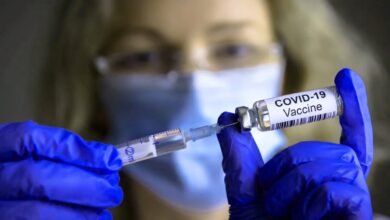How Diet Affects Your Skin: What to Eat for Clear Skin
How Diet Affects Your Skin: Discover the best foods for clear skin and learn how your diet impacts skin health for a radiant, glowing complexion.

The connection between diet and skin health is undeniable, as what we eat directly impacts our skin’s appearance, texture, and overall health. The focus keyword, “How Diet Affects Your Skin,” highlights the importance of understanding how the foods we consume can either promote a radiant complexion or contribute to skin issues like acne, dryness, and inflammation. Our skin is the body’s largest organ, and it reflects our internal health, making it essential to nourish it from within. By making informed dietary choices, we can address common skin concerns and achieve a clearer, healthier glow.
In this article, we will explore the science behind how diet affects your skin, identify the best foods for clear skin, and discuss how certain dietary habits can either help or harm your complexion. From the role of antioxidants and hydration to the impact of sugar and processed foods, we’ll provide a comprehensive guide to achieving and maintaining healthy skin through nutrition.
The Science Behind Diet and Skin Health
The skin is a reflection of our overall health, and its condition is influenced by various factors, including genetics, environment, and lifestyle. However, diet plays a pivotal role in determining the health and appearance of our skin. Nutrients from the foods we eat are absorbed into the bloodstream and delivered to the skin, where they contribute to cell repair, collagen production, and protection against environmental damage. For example, vitamins like A, C, and E are essential for maintaining skin elasticity and fighting free radicals, while omega-3 fatty acids help reduce inflammation and keep the skin hydrated.
On the other hand, a poor diet high in processed foods, sugar, and unhealthy fats can lead to skin problems such as acne, premature aging, and dullness. Studies have shown that diets rich in refined carbohydrates and sugary foods can spike insulin levels, leading to increased oil production and clogged pores. Similarly, a lack of essential nutrients can weaken the skin’s barrier function, making it more susceptible to irritation and damage. Understanding the science behind how diet affects your skin is the first step toward making better food choices for a clearer, healthier complexion.
Foods That Promote Clear Skin
Antioxidant-Rich Foods: Antioxidants are crucial for protecting the skin from oxidative stress caused by free radicals. Foods like berries, spinach, kale, and dark chocolate are packed with antioxidants that help combat signs of aging and promote a radiant complexion.
Healthy Fats: Omega-3 fatty acids, found in fatty fish like salmon, walnuts, and flaxseeds, are known for their anti-inflammatory properties. These fats help maintain the skin’s lipid barrier, keeping it hydrated and reducing redness and irritation.
Vitamin C-Rich Foods: Vitamin C is essential for collagen production, which keeps the skin firm and youthful. Citrus fruits, bell peppers, and broccoli are excellent sources of this vital nutrient.
Hydrating Foods: Proper hydration is key to maintaining plump, glowing skin. Foods with high water content, such as cucumbers, watermelon, and celery, help keep the skin hydrated from the inside out.
Probiotics: Gut health and skin health are closely linked. Fermented foods like yogurt, kefir, and sauerkraut contain probiotics that support a healthy gut microbiome, which in turn can reduce inflammation and improve skin conditions like acne and eczema.
Foods to Avoid for Clear Skin
While certain foods can enhance skin health, others can have the opposite effect. Diets high in sugar, refined carbohydrates, and unhealthy fats can trigger inflammation and exacerbate skin issues. For example, sugary snacks and beverages can lead to insulin spikes, which increase oil production and clog pores. Similarly, processed foods often contain additives and preservatives that can irritate the skin and disrupt its natural balance. Dairy products have also been linked to acne in some individuals, as they can stimulate hormone production and increase oil secretion. By limiting these foods and focusing on a nutrient-rich diet, you can support your skin’s health and reduce the risk of breakouts and other skin concerns.
The Role of Hydration in Skin Health
Hydration is a cornerstone of healthy skin. Water helps flush out toxins, deliver nutrients to skin cells, and maintain the skin’s elasticity and plumpness. Dehydration, on the other hand, can lead to dryness, flakiness, and an increased appearance of fine lines and wrinkles. While drinking plenty of water is essential, consuming hydrating foods like cucumbers, oranges, and lettuce can further boost your skin’s moisture levels. Herbal teas and coconut water are also excellent options for staying hydrated while providing additional skin-loving nutrients.
The Gut-Skin Connection
Emerging research has highlighted the strong connection between gut health and skin health. The gut microbiome, which consists of trillions of bacteria, plays a crucial role in regulating inflammation and immune responses. An imbalance in gut bacteria, known as dysbiosis, can lead to skin conditions like acne, rosacea, and eczema. Incorporating probiotic-rich foods like yogurt, kimchi, and miso into your diet can help restore balance to the gut microbiome and improve skin health. Additionally, prebiotic foods like garlic, onions, and bananas feed the beneficial bacteria in the gut, further supporting a healthy complexion.
The Impact of Sugar and Processed Foods
Sugar and processed foods are among the biggest culprits when it comes to skin issues. High-glycemic foods, such as white bread, pastries, and sugary snacks, cause rapid spikes in blood sugar levels, leading to increased insulin production. This, in turn, triggers the release of androgens, which stimulate oil production and clog pores. Over time, a diet high in sugar can also lead to glycation, a process in which sugar molecules attach to collagen and elastin fibers, causing the skin to lose its elasticity and develop wrinkles. By reducing your intake of sugar and processed foods, you can protect your skin from these damaging effects and maintain a youthful, clear complexion.
The Benefits of a Balanced Diet
A balanced diet that includes a variety of nutrient-dense foods is the foundation of healthy skin. By incorporating fruits, vegetables, whole grains, lean proteins, and healthy fats into your meals, you can provide your skin with the essential nutrients it needs to thrive. A diverse diet not only supports skin health but also promotes overall well-being, reducing the risk of chronic diseases and boosting energy levels. Remember, achieving clear skin is not about following restrictive diets or eliminating entire food groups but rather about making mindful, sustainable choices that nourish your body and skin.
Read More: Home Remedies for Digestive Issues & Bloating
Conclusion
In conclusion, the relationship between diet and skin health is profound, and understanding how diet affects your skin can empower you to make better food choices for a clearer, healthier complexion. By incorporating antioxidant-rich foods, healthy fats, and hydrating ingredients into your diet, you can support your skin’s natural functions and protect it from damage. At the same time, avoiding sugar, processed foods, and other skin-damaging culprits can help prevent breakouts and premature aging.
Ultimately, achieving clear skin is a holistic process that involves not only what you eat but also how you care for your body and mind. By adopting a balanced, nutrient-rich diet and maintaining a healthy lifestyle, you can unlock the secret to radiant, glowing skin that reflects your overall well-being.
FAQs
Can diet alone cure acne?
While diet plays a significant role in skin health, acne is often influenced by multiple factors, including hormones, genetics, and skincare habits. A healthy diet can improve acne but may not eliminate it entirely.
How long does it take to see changes in my skin after improving my diet?
Skin cell turnover takes about 28 days, so you may start to see improvements in your skin within a month of making dietary changes.
Are there specific foods that cause acne?
Foods high in sugar, refined carbs, and dairy have been linked to acne in some individuals, but triggers can vary from person to person.
Do I need to drink a lot of water for clear skin?
Hydration is important for skin health, but water intake alone won’t guarantee clear skin. A balanced diet and proper skincare are also essential.
Can a vegan diet improve skin health?
A well-planned vegan diet rich in fruits, vegetables, and plant-based fats can improve skin health, but it’s important to ensure you’re getting all essential nutrients.











